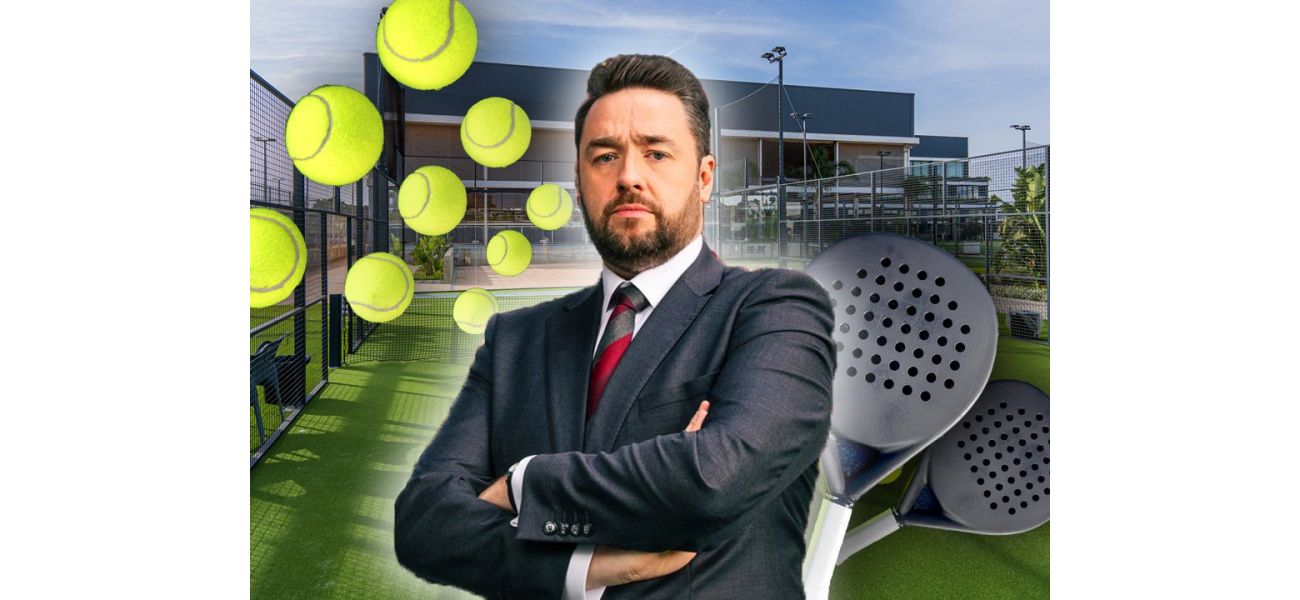Jason Manford admits his dream of competing in Olympic padel has come true as the sport gains popularity in the UK.
The comedian is extremely grave.
November 20th 2024.

Jason Manford is a man on a mission. A mission to spread the love and joy of padel, a sport that has taken the United Kingdom by storm. But with its sudden rise in popularity, comes a lot of questions and concerns.
There are those who believe that padel poses a serious threat to the traditional sport of tennis, with even legendary player Novak Djokovic voicing his concerns. On the other hand, some dismiss padel as just a passing trend. Critics have also pointed out issues such as noise levels and difficulty in finding four players, as the game is primarily played in doubles. But for true padel enthusiasts like Jason Manford, the biggest worry is the potential for the sport to become exclusive and elitist.
Despite being known for his comedic talent, Manford is dead serious when it comes to padel. He himself was drawn to the sport after a shoulder injury forced him to give up tennis. And now, he is determined to see padel grow and flourish. However, while the sport has seen an impressive growth, there have been setbacks as well, like Great Britain's failure to enter a team at the last world youth championships. But there are those who are learning from past mistakes, like the founder of a new padel club in London, who hails from Sweden.
So what exactly is padel and where did it come from? Well, it was invented by Enrique Corcuera in Acapulco, Mexico and has since spread to different parts of the world, including Europe, South America, and Australia. It has become particularly popular in Spain, where it is the second-most-played sport. It's a unique combination of tennis, squash, and badminton, played in a walled court that is about a third the size of a tennis court. The rackets used are solid and without strings, and the scoring system is similar to tennis.
Manford, who is a self-proclaimed padel addict, believes that the sport is perfect for older men, who may have suffered injuries and want to stay active without putting too much strain on their bodies. He himself had to switch to padel due to a rotator cuff injury in his left shoulder. He also points out that many of his friends, who are in their fifties, have also made the switch from tennis to padel for the same reason. Samuel De Haan, the founder of a padel club in Kent, agrees, stating that they have many members who have switched from tennis due to injuries and find padel to be a more suitable option.
One of the biggest draws of padel is its accessibility. The court is smaller, making it easier to play and the underarm serve is less physically demanding. Padel rackets come in a wide range of prices, from as low as £29.99 to as high as £330, depending on the brand and quality. But despite the growing popularity of padel, the belief that it will replace tennis is far from the truth. In fact, it serves as an introduction to racket sports for many children. Sebastian Gordon, the founder of a padel club in Battersea Power Station, believes that they are not in competition with tennis, but rather with other forms of entertainment like restaurants, cinemas, and even Netflix. Padel is seen as a social and easy-to-learn sport, making it appealing to a wider audience.
The Lawn Tennis Association (LTA) has also taken notice of the growth of padel in the UK. They have invested £6 million into 40 padel facility projects, resulting in a total of 75 new courts. The number of participants has also grown from 6,000 to 129,000 since 2019. But with this growth, comes the concern of padel becoming an elitist sport. Manford, being a proud Mancunian, is worried about the sport becoming exclusive and inaccessible to those from working-class backgrounds. He has joined forces with the LTA and other private investors to bring padel to schools in underprivileged areas. He also hopes to get the support of the Mayor of Greater Manchester, Andy Burnham.
But Manford has experienced challenges in his mission to make padel more accessible. He has had to convince private investors to fund the installation of padel courts in schools, and also requires support from brands like Castore and Babolat. He believes that the only way to truly make padel viable is by offering it for free to schools and then renting out the courts on weekends and evenings. And while there may be obstacles, Manford remains determined to see padel continue to grow and thrive in the UK.
Jason Manford takes his love for padel very seriously. Padel, a racket sport, has seen a massive surge in popularity all across the United Kingdom. But with its rise, come many questions and concerns. Some, like the legendary Novak Djokovic, fear that padel may pose a threat to the sport of tennis. Others believe it to be nothing more than a passing fad.
Critics have also raised concerns about the noise level of the sport and the difficulty of getting four people together to play, as padel is typically played in doubles. There is also worry that the sport may become too exclusive, as it gains more enthusiasts like Jason Manford.
Manford, a self-proclaimed padel addict who switched from tennis after a shoulder injury, is determined to help grow the sport. While he may make a living from making people laugh, when it comes to padel, he is all business.
Despite its rapid growth, Great Britain was unable to field a team at the last world youth championships. However, the founder of a new padel club in London has learned from the mistakes made in his home country of Sweden and is confident in the sport's future.
As the popularity of padel continues to rise, some have begun to question whether it may eventually overtake tennis. Djokovic, for one, has expressed concern that club tennis is "endangered" due to the rise of alternative sports such as padel and pickleball in the United States.
There is some truth to this concern, especially for those who have reached a certain age and have suffered injuries. Padel offers a less strenuous option with a smaller court, making it easier to play. Additionally, new padel clubs are popping up all over the place, making it more accessible.
Padel was invented by Enrique Corcuera in Acapulco, Mexico and has since spread across the globe to Europe, South America, and Australia. It is particularly popular in Spain, where it has become the second-most-popular sport. This racket game combines elements of tennis, squash, and badminton and is most commonly played in doubles on a walled court about a third of the size of a tennis court. The scoring system is the same as in tennis, and players use solid rackets without strings, serving underhand.
According to Manford, padel is perfect for older men who still want to stay active but may be prone to injury. He personally switched to padel after injuring his rotator cuff on his left shoulder, which made serving in tennis too painful. He believes that for those in their 50s and beyond, padel offers a more manageable option compared to traditional tennis.
Samuel De Haan, the founder of Square One Padel in Kent, agrees with Manford, stating that many members at his club have come from tennis due to injuries such as hip and back pain. They find that the smaller court and less strenuous impact on the body make padel a more feasible option.
While the cost of padel rackets can vary greatly, with some priced as low as £29.99 and others as high as £330, the idea that padel will completely replace tennis is farfetched. Instead, it serves as an introduction to racket sports for many children.
Sebastian Gordon, the founder of Rocket Padel at Battersea Power Station, does not see padel as a competitor to tennis but rather as an alternative to other forms of entertainment such as restaurants, cinemas, and streaming services like Netflix. He believes that the social aspect and low barrier to entry make it an appealing option for many.
Manford also sees padel as a gateway to other racket sports, including tennis. He believes that for young children, padel is a great way to learn and build skills before moving on to other sports like tennis. However, he does not see padel as a rival to tennis, but rather a complementary sport.
According to the Lawn Tennis Association, since becoming the national governing body for padel in Britain in 2020, significant investments have been made to support and develop the sport. Private investors and the LTA Tennis Foundation have contributed a total of £6 million to fund 75 new courts across 40 projects, as well as support the competition structure, performance, and coach development. The number of courts has grown from 50 to 350, and annual participation has increased from 6,000 to 129,000 since 2019.
One concern surrounding the growth of padel is that it may become an elitist sport. However, Manford, who hails from Manchester, is determined to prevent this from happening. He has partnered with the Lawn Tennis Association and other private investors to install padel courts in schools in underprivileged areas. He has also been in contact with the Mayor of Greater Manchester, Andy Burnham.
Manford has already faced obstacles when trying to install courts in schools. He needs to convince private investors of the sport's potential and gain support from brands like Castore and Babolat. He is determined to make padel more accessible and prevent it from becoming an elitist sport.
Despite the concerns and challenges, padel continues to grow in popularity all across the United Kingdom. It offers a more manageable option for those who may have injuries or simply prefer a less strenuous sport. While it may never completely replace tennis, it serves as a great introduction to racket sports and offers a more social and inclusive community. With the support of people like Jason Manford and the LTA, the future of padel in the UK looks bright.
There are those who believe that padel poses a serious threat to the traditional sport of tennis, with even legendary player Novak Djokovic voicing his concerns. On the other hand, some dismiss padel as just a passing trend. Critics have also pointed out issues such as noise levels and difficulty in finding four players, as the game is primarily played in doubles. But for true padel enthusiasts like Jason Manford, the biggest worry is the potential for the sport to become exclusive and elitist.
Despite being known for his comedic talent, Manford is dead serious when it comes to padel. He himself was drawn to the sport after a shoulder injury forced him to give up tennis. And now, he is determined to see padel grow and flourish. However, while the sport has seen an impressive growth, there have been setbacks as well, like Great Britain's failure to enter a team at the last world youth championships. But there are those who are learning from past mistakes, like the founder of a new padel club in London, who hails from Sweden.
So what exactly is padel and where did it come from? Well, it was invented by Enrique Corcuera in Acapulco, Mexico and has since spread to different parts of the world, including Europe, South America, and Australia. It has become particularly popular in Spain, where it is the second-most-played sport. It's a unique combination of tennis, squash, and badminton, played in a walled court that is about a third the size of a tennis court. The rackets used are solid and without strings, and the scoring system is similar to tennis.
Manford, who is a self-proclaimed padel addict, believes that the sport is perfect for older men, who may have suffered injuries and want to stay active without putting too much strain on their bodies. He himself had to switch to padel due to a rotator cuff injury in his left shoulder. He also points out that many of his friends, who are in their fifties, have also made the switch from tennis to padel for the same reason. Samuel De Haan, the founder of a padel club in Kent, agrees, stating that they have many members who have switched from tennis due to injuries and find padel to be a more suitable option.
One of the biggest draws of padel is its accessibility. The court is smaller, making it easier to play and the underarm serve is less physically demanding. Padel rackets come in a wide range of prices, from as low as £29.99 to as high as £330, depending on the brand and quality. But despite the growing popularity of padel, the belief that it will replace tennis is far from the truth. In fact, it serves as an introduction to racket sports for many children. Sebastian Gordon, the founder of a padel club in Battersea Power Station, believes that they are not in competition with tennis, but rather with other forms of entertainment like restaurants, cinemas, and even Netflix. Padel is seen as a social and easy-to-learn sport, making it appealing to a wider audience.
The Lawn Tennis Association (LTA) has also taken notice of the growth of padel in the UK. They have invested £6 million into 40 padel facility projects, resulting in a total of 75 new courts. The number of participants has also grown from 6,000 to 129,000 since 2019. But with this growth, comes the concern of padel becoming an elitist sport. Manford, being a proud Mancunian, is worried about the sport becoming exclusive and inaccessible to those from working-class backgrounds. He has joined forces with the LTA and other private investors to bring padel to schools in underprivileged areas. He also hopes to get the support of the Mayor of Greater Manchester, Andy Burnham.
But Manford has experienced challenges in his mission to make padel more accessible. He has had to convince private investors to fund the installation of padel courts in schools, and also requires support from brands like Castore and Babolat. He believes that the only way to truly make padel viable is by offering it for free to schools and then renting out the courts on weekends and evenings. And while there may be obstacles, Manford remains determined to see padel continue to grow and thrive in the UK.
Jason Manford takes his love for padel very seriously. Padel, a racket sport, has seen a massive surge in popularity all across the United Kingdom. But with its rise, come many questions and concerns. Some, like the legendary Novak Djokovic, fear that padel may pose a threat to the sport of tennis. Others believe it to be nothing more than a passing fad.
Critics have also raised concerns about the noise level of the sport and the difficulty of getting four people together to play, as padel is typically played in doubles. There is also worry that the sport may become too exclusive, as it gains more enthusiasts like Jason Manford.
Manford, a self-proclaimed padel addict who switched from tennis after a shoulder injury, is determined to help grow the sport. While he may make a living from making people laugh, when it comes to padel, he is all business.
Despite its rapid growth, Great Britain was unable to field a team at the last world youth championships. However, the founder of a new padel club in London has learned from the mistakes made in his home country of Sweden and is confident in the sport's future.
As the popularity of padel continues to rise, some have begun to question whether it may eventually overtake tennis. Djokovic, for one, has expressed concern that club tennis is "endangered" due to the rise of alternative sports such as padel and pickleball in the United States.
There is some truth to this concern, especially for those who have reached a certain age and have suffered injuries. Padel offers a less strenuous option with a smaller court, making it easier to play. Additionally, new padel clubs are popping up all over the place, making it more accessible.
Padel was invented by Enrique Corcuera in Acapulco, Mexico and has since spread across the globe to Europe, South America, and Australia. It is particularly popular in Spain, where it has become the second-most-popular sport. This racket game combines elements of tennis, squash, and badminton and is most commonly played in doubles on a walled court about a third of the size of a tennis court. The scoring system is the same as in tennis, and players use solid rackets without strings, serving underhand.
According to Manford, padel is perfect for older men who still want to stay active but may be prone to injury. He personally switched to padel after injuring his rotator cuff on his left shoulder, which made serving in tennis too painful. He believes that for those in their 50s and beyond, padel offers a more manageable option compared to traditional tennis.
Samuel De Haan, the founder of Square One Padel in Kent, agrees with Manford, stating that many members at his club have come from tennis due to injuries such as hip and back pain. They find that the smaller court and less strenuous impact on the body make padel a more feasible option.
While the cost of padel rackets can vary greatly, with some priced as low as £29.99 and others as high as £330, the idea that padel will completely replace tennis is farfetched. Instead, it serves as an introduction to racket sports for many children.
Sebastian Gordon, the founder of Rocket Padel at Battersea Power Station, does not see padel as a competitor to tennis but rather as an alternative to other forms of entertainment such as restaurants, cinemas, and streaming services like Netflix. He believes that the social aspect and low barrier to entry make it an appealing option for many.
Manford also sees padel as a gateway to other racket sports, including tennis. He believes that for young children, padel is a great way to learn and build skills before moving on to other sports like tennis. However, he does not see padel as a rival to tennis, but rather a complementary sport.
According to the Lawn Tennis Association, since becoming the national governing body for padel in Britain in 2020, significant investments have been made to support and develop the sport. Private investors and the LTA Tennis Foundation have contributed a total of £6 million to fund 75 new courts across 40 projects, as well as support the competition structure, performance, and coach development. The number of courts has grown from 50 to 350, and annual participation has increased from 6,000 to 129,000 since 2019.
One concern surrounding the growth of padel is that it may become an elitist sport. However, Manford, who hails from Manchester, is determined to prevent this from happening. He has partnered with the Lawn Tennis Association and other private investors to install padel courts in schools in underprivileged areas. He has also been in contact with the Mayor of Greater Manchester, Andy Burnham.
Manford has already faced obstacles when trying to install courts in schools. He needs to convince private investors of the sport's potential and gain support from brands like Castore and Babolat. He is determined to make padel more accessible and prevent it from becoming an elitist sport.
Despite the concerns and challenges, padel continues to grow in popularity all across the United Kingdom. It offers a more manageable option for those who may have injuries or simply prefer a less strenuous sport. While it may never completely replace tennis, it serves as a great introduction to racket sports and offers a more social and inclusive community. With the support of people like Jason Manford and the LTA, the future of padel in the UK looks bright.
[This article has been trending online recently and has been generated with AI. Your feed is customized.]
[Generative AI is experimental.]
0
0
Submit Comment





